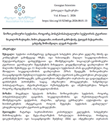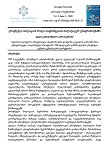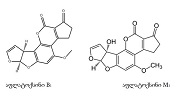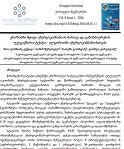LEADERSHIP THEORIES AND POST SOVIET AUTHORITARIAN LEADERS
Downloads
Based on the theories (of personality traits’, situational, followers’, psychological) related to the emergence of political leadership, on the basis of comparative and qualitative methods, the characteristics of political leadership have been studied in the post-Soviet era. A leader uses the situation, relies upon the followers, and, in most cases, the great leaders awarded with charisma are characterized by a whole range of psychological features, but in all cases the determining role is played by the qualities of a leader, the majority of which are inherited. In our opinion, the argument provided by researchers that regular mortals may be gifted with the traits of a leader, is not convincing in disproving “the theory of traits ” due to two reasons: first, a leader is a human being, a social creature (human is a political being and separately, as a self-sufficient entity, it is either a beast or a god – Aristotle) and naturally they possess human features; second, a leader has to be characterized by a high degree (dosage) of distinguishing attributes and, most importantly, they are the main force in the process of striving towards the governance and all the other actions subordinate to them. This judgement is concerning the great leaders distinguished in the history of humankind, the actions of whom have changed the vector of the history development, and there are no leaders with such skills and capacity on the post-Soviet political stage yet. The hypothesis of the topic to be researched is as follows: the traits of leadership in the political arena of post-Soviet countries are determined by the dominance of the subject political culture, heavy social-economic background, the specifics of a national-psychological and mental development of a given nation, foreign policy orientations. Each of the above-mentioned variables influence the process of selecting leaders in different degrees (for example: in the reality of Georgia the foreign policy orientation is a significant condition to the position of a leader in the government, because the key of country’s independence lies outside the country and the inclination towards “looking up to the foreign/a foreigner” is relevant to Georgian mentality and the mindset of electorate, while in Russia a leader is mainly characterized and inspired by the Russian geo-political interests, orthodox-messiah ideas and mainly has to support the national idea consolidating the “Great Russian chauvinism” and Russian “Sovereign Democracy”, but in all settings the determining factor is the excessiveness of the subordinate political orientations (except for the Baltic countries) in the presence of which, according to Almond and Verba’s concept of political culture, the majority of citizens expect the desirable actions from the leader – the savior of the country and the state; all of this, in the environment of poor economic development and weak institutions, consequently leads to excessive number of populist, authoritative leaders in national governments.
Downloads
პიტერ გაი ნორთჰაუზი. (2010) ლიდერობა: თეორია და პრაქტიკა/ მე-5 გამოცემა. გვ 23;
ნ. მაკიაველი (1984) თბ; გვ 183–184. (https://library.iliauni.edu.ge/wp-content/uploads/2017/03/makiaveli.pdf)
ფ. ნიცშე (1992) ესე იტყოდა ზარატუსტრა თბ; გვ 43; 144; 145.
Франк С.Л. (1990). Сочинения. М გვ 61–62;
მერაბ ხმალაძე. კორელაციურ-რეგრესიული ანალიზის სტატისტიკური. მეთოდების განვითარება. (https://dspace.tsu.ge › bitstream › handle › Develo. ნანახია 12.5.2021).
Блондель Ж. (1999) Политическая лидерства Раигородский Д. Я. Психология и психоанализ власти: Хрестоматия, Т 1. Самара გვ 61–62, 406.
Bass, B.M., & Riggio, R.E. (2006). Transformational Leadership (2d Edition). New York: Taylor & გვ 244; Bass, B.M. (1990). Bass and Stogdill’s handbook of leadership: A survey of theory and research. New York: Free press Bennis, W. G., & Nanus, B. (1985). Leaders: The strategies for taking charge. New York: Harper & Row. Bryman, A. (1992). Charisma and leadership in organizations. London: Sage.
Lasswell h. (1948) Power and Personality. N.Y ;
Лассуэлл Гарольд Д. (2005) Психопатология и политика: Монография / Пер. с англ.
Л 26 Т.Н.Самсоновой, Н.В.Коротковой. - М.: Издательство РАГС, გვ 71.
Ашин Г.И (1999) Курс элитологии. М გვ 37;
Kelley, R. (1992). The Power of Followership. New York, NY . გვ 12;
რ. სტოგდილის ლიდერული თვისებების ანალიზი: (https://studbooks.net/1384459/menedzhment/teoreticheskie_aspekty_vospitaniya_lidera ნანახია 13.5. 2020)
ილია ჭავჭავაძე. (1984) თხზ; თბ; გვ 606–607;
ვ. პუტინის საინაუგურაციო სიტყვა (2000) (https://www.mn.ru/blogs/blog_reference/80928)
Победоносцев К.П. (1996) Московский сборник. Победоносцев К.П. pro et contra. გვ 110
„ლევადა“ ცენტრი: პუტინის რეიტინგი ახალგაზრდებს შორის დაეცა 36%–დან–20%–მდე (https://meduza.io/news/2020/12/10/levada-reyting-putina-u-molodezhi-upal-za-god-c-36-do-20 ნანახია 3.5. 2021)
2020 წლის 3 ოქტომბრის გამოკითხვის შედეგებმა გერმანიაში:
(https://uf.ru/news/politics/u9/2020/10/03/303686?utm_source=yxnews&utm_medium=desktop ნანახია 28. 8.2021)
Gaman-Golutvina O. (2016) Elites and Leadership in Russian Politics. The Ashgate Research Companion to Political Leadership. 1st Edition. London And New York: Published by Routledge. 23.
პუტინის სიტყვა მიუნხენში (2007) (https://ru.wikisource.org/wiki/Rec Putina v Miunxene )_
პუტინის შეხვედრა ტრამპთან (2018) (discred.ru›tag/press…putina-i-trampa-v-helsinki)
პუტინის რეიტინგი გაიზარდა პარლამენტისადმი მიმართვის შემდეგ: (https://www.interfax.ru/russia/762948)
პუტინის რეიტინგი განაგრძობს კლებას: (https://www.the-village.ru/shorts/reyting-putina-kanava ნანახია 8.25.2021)
სტივენ ფ. ჯონსი. (2013) დემოკრატია საქართველოში. (http.//www. cicerofoundation.org / legtures/ Stephen Jones Georgia.pdf)
ა. ტუკვაძე (2014) პოლიტიკური კულტურის შედარებითი ანალიზი, თბ; გვ 125

This work is licensed under a Creative Commons Attribution-NonCommercial-NoDerivatives 4.0 International License.


























































































































































































































